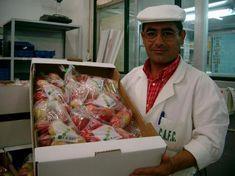
Four of the main pear producers in the Oeste region of Portugal are supplying the UK’s schools programme with apples.
Grown by the Coopval producers’ co-operative in Cadaval, in the Maca de Alcobaçã area, some 200 tonnes of apples this year have been exported - volumes to the UK are expected to expand as a good proportion of the fruit meets the size specs required by school suppliers.
Luis Vicente, another producer, also plans to significantly raise volumes for the UK. Small quantities were exported in 2003 to UK supermarkets. “In 2003 we sent two or three trucks with Portuguese-grown apples to supply the UK,” says commercial manager Manuel Chaves, “but we hope we can send 50 trucks in the coming season.”
For Unirocha, based in Peral, apple output in 2003 was 330,000t and in 2004, this level is expected to increase by 15 per cent, says agronomist Délia Fialho. “Unirocha exports 5-10 per cent of its apple production - Gala goes to the UK and Ireland, and some of the other varieties are exported to ex-Portuguese colonies, but volumes are minor in comparison,” says Fialho. The company has been involved with UK importers for three seasons, supplying UK supermarkets such as Tesco for their children’s fruit ranges.
Branded Unirocha 5-a-day bags contain 10 pieces of fruit. “Apples are year-round,” says Fialho, “and a good fruit for the 5-a-day scheme as it can act as a filler. This is a market that Unirocha will expand.”
Production in Portugal is relatively low compared to other European producers and the national consumers prefer Portuguese varieties, which is the primary reason that only small volumes are available for export markets. According to Fialho, apple production actually exceeds the more-recognised pear production in Portugal but the majority goes to serve the local market.
He adds: “Unirocha has 400ha dedicated to apple production, growing different varieties such as Golden Reinata and Fuji. We started five years ago but it is Gala apples that have become our main variety - it is easy to grow and has a good season from August to February. We have increased production because it is a robust and the UK market appreciates more that just the colour, quality and size, but also it agronomic qualities which gives them a good texture and tasty. Over the last few years, Gala has moved from the bottom of the pile to the top in terms of quality. We will increase production if both Gala and Fuji.
“The main difficulty in supplying the UK is not having sufficient quantities,” says Fialho. “The trend for the future is to increase plantations of both Gala and Fuji varieties, as well as return to production of more traditional Portuguese varieties for the local market.”
Similarly Granfer, another cooperative society of local fruit producers founded in 1986, has been exporting fruit to the UK for many years but it was only when an existing UK customer introduced it to the possibility of exporting locally grown Gala apples that the UK market opened up. This year harvesting commenced in mid-September, says quality technologist Susana Silva, 7-10 days late because tress blossoming was late due to weather conditions in April. “We have exported Royal Gala and Mondial Gala for the UK schools programme since 2002,” says commercial and marketing manager Hélio Ferreira. “Our apples compete with French Gala in the UK but Portuguese Gala has similar qualities to South African - high brix, robust and colour and size - characteristics the UK market prefers.”
Since 2002, volumes sent have tripled form 300t to 1,000t for this season. Apples are packed into 1kg bags or punnets, as the customer prefers, to supply both major UK multiples and the 5-a-day programme. The group is not new to growing apples and has been growing Gala apples for 12 years as well as supplying the Portuguese market with local varieties such as a Bravo de Esmole. “Gala apples were being imported to meet local demand, so we started growing them,” says Ferreira. “Initially we didn’t consider it as an export crop - it has been a natural progression.” Although this season’s volumes are lower than normal, Granfer plans to increase the number of hectares dedicated to apple production.
The Portuguese apple association is younger than the National Association for Pears (ANP), says Fialho, but it has the advantage that it can piggyback on the success of the ANP to unite apple producers. “Foreign markets just need to learn and understand the different characteristics of apples grown in Oeste and north of Portugal.”



